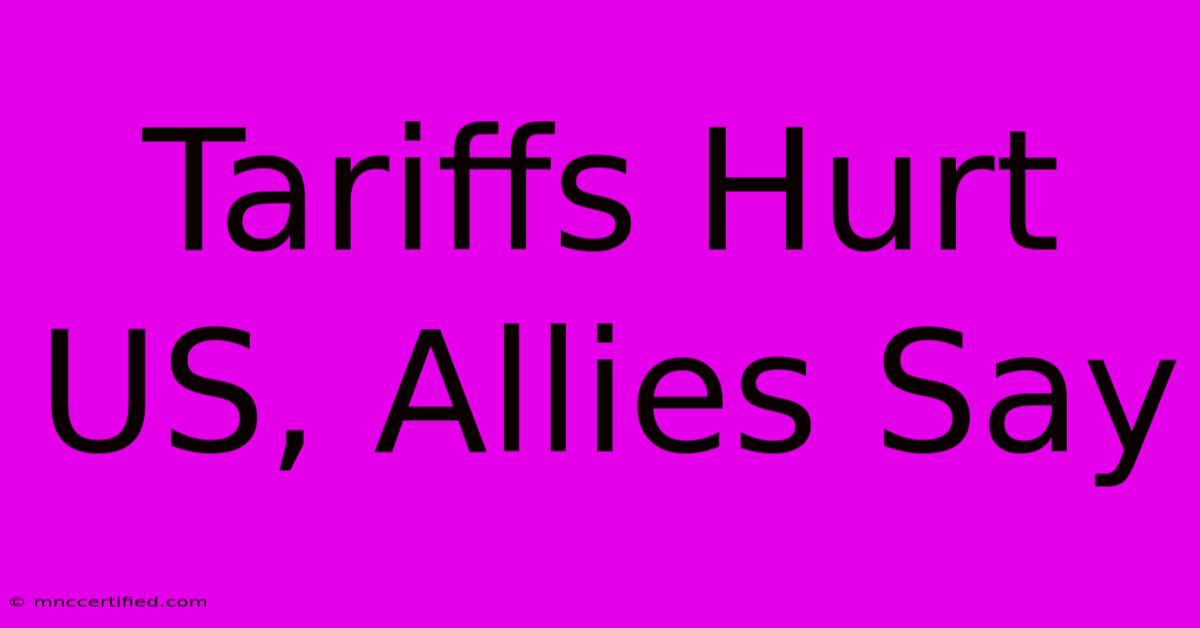Tariffs Hurt US, Allies Say

Table of Contents
Tariffs Hurt US, Allies Say: A Deep Dive into Trade Wars and Their Consequences
The imposition of tariffs, while sometimes presented as a tool to protect domestic industries and boost national economies, has consistently drawn criticism from allies who argue that such measures ultimately inflict harm on both the imposing nation and its trading partners. This article delves into the multifaceted argument that tariffs, especially those implemented unilaterally, negatively impact the United States and its allies.
The Economic Fallout of Tariffs
The most immediate and widely acknowledged consequence of tariffs is increased prices for consumers. When import duties are levied on goods, those costs are often passed on to consumers in the form of higher prices. This can disproportionately affect low-income households, who spend a larger percentage of their income on essential goods. This increased cost of living directly contradicts the intended goal of boosting national economies.
Beyond consumer costs, tariffs also hinder economic growth. They disrupt established supply chains, leading to delays, uncertainties, and increased production costs for businesses that rely on imported components or materials. This can stifle innovation and competitiveness, ultimately reducing overall economic output. The negative impact on business investment is significant, as uncertainty surrounding trade policies discourages long-term planning and investment.
Furthermore, retaliatory tariffs are a common response to protectionist measures. When one country imposes tariffs, other countries often retaliate in kind, leading to a trade war where everyone loses. This tit-for-tat exchange escalates tensions and reduces overall global trade, hindering economic growth across the board. This cycle is particularly damaging to businesses engaged in international trade, forcing them to navigate a complex and unstable landscape.
Case Studies: The Impact on Specific Industries
The impact of tariffs varies greatly across different sectors. For example, the steel industry, often cited as a beneficiary of protectionist policies, may see short-term gains. However, downstream industries that rely on steel, such as automotive manufacturing, often face significantly increased costs, potentially leading to job losses and reduced competitiveness. This ripple effect underscores the interconnectedness of global economies and highlights the unintended consequences of protectionist measures. Similar consequences are observed in other sectors such as agriculture and technology, where reliance on global supply chains makes them particularly vulnerable.
Strained International Relations: The Diplomatic Cost of Tariffs
Beyond the economic impacts, tariffs also severely strain international relations. The imposition of tariffs, particularly those imposed unilaterally without consultation or negotiation, can be viewed as an act of economic aggression by trading partners. This can lead to damaged trust and fractured alliances, undermining crucial diplomatic relationships.
The loss of international goodwill has long-term consequences, affecting future collaborations on issues ranging from climate change to global security. These diplomatic repercussions are often far more costly and harder to reverse than the short-term economic benefits often touted by proponents of tariffs. The erosion of multilateral trade agreements further complicates international cooperation and undermines the stability of the global trading system.
The Argument for Free Trade and International Cooperation
The overwhelming consensus among economists is that free trade, characterized by minimal barriers to the exchange of goods and services, leads to greater economic growth, increased efficiency, and lower prices for consumers. International cooperation, through multilateral agreements and negotiations, is crucial for establishing stable and predictable trade rules, promoting a level playing field for businesses, and preventing the escalation of trade disputes. These frameworks are essential for fostering a healthy global economy that benefits all participants.
Conclusion: A Path Towards Sustainable Trade
The argument that tariffs hurt the US and its allies is strongly supported by economic evidence and real-world examples. While the protectionist impulse might appear appealing in the short term, the long-term consequences of tariffs—from increased consumer prices and reduced economic growth to strained international relations—far outweigh any perceived benefits. Embracing free trade, fostering international cooperation, and focusing on policies that promote innovation and competitiveness are crucial steps towards building a sustainable and prosperous global economy.

Thank you for visiting our website wich cover about Tariffs Hurt US, Allies Say. We hope the information provided has been useful to you. Feel free to contact us if you have any questions or need further assistance. See you next time and dont miss to bookmark.
Featured Posts
-
Does Apostrophe Take Insurance
Nov 27, 2024
-
Guardians Update On Wendy Williams
Nov 27, 2024
-
Millions Get Extra Day Off 2025
Nov 27, 2024
-
Bethany Basic Health Insurance
Nov 27, 2024
-
Future Of Vanderpump Rules Stars
Nov 27, 2024